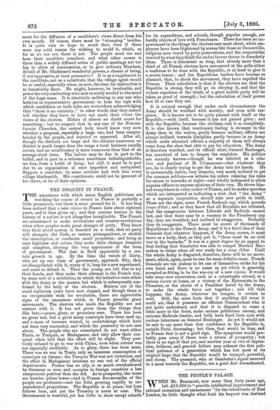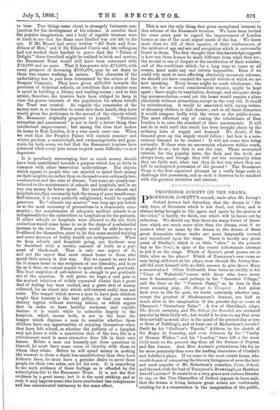THE PEOPLE'S PALACE.
WHEN Mr. Beaumont, now more than forty years ago, left £12,000 to "provide intellectual improvement and rational recreation and amusement "for the inhabitants of East London, he little thought what fruit his bequest was destined
to bear. Two things came about in strangely fortunate con- junction for the development of his scheme. A novelist fired the popular imagination, and a body of capable trustees were at hand to see that the flame once kindled was not left to die out. If Mr. Besant had never written "All Sorts and Con- ditions of Men," and if Sir Edmund Currie and his colleagues had not worked their hardest to prove that the " Palace of Delight " there described might be realised in brick and mortar, the Beaumont Trust would still have been concerned with £12,000 and no more. That it has grown into £75,000, with every prospect of becoming £100,000, may be set down to these two causes working in unison. The character of the undertaking has in part been determined by the action of the Drapers' Company. They have given £20,000 towards the provision of technical schools, on condition that a similar sum is spent in building a library and reading-rooms ; and to this extent, therefore, the trustees have been obliged to keep in view the graver interests of the population for whose benefit the Trust was created. As regards the remainder of the money now in or hereafter to come into their hands, they have wisely given the preference to the second of the objects which Mr. Beaumont originally proposed to himself. "Rational recreation and amusement " is not in itself a better thing than intellectual improvement ; but among the class that makes its home in East London, it is a very much rarer one. When we read that the People's Palace will contain summer and winter gardens, a concert-hall, and swimming-baths and gym- nasia for both sexes, we feel that the Beaumont trustees have achieved what every year seems to grow more difficult,—a new departure.
It is peculiarly encouraging that so much money should have been contributed towards a purpose which has so little in common with other benevolent undertakings. The objects which appeal to people who are minded to spend their money on their neighbours rather than on themselves are ordinarily two, —education and the cure of disease. Vast sums are yearly con- tributed to the maintenance of schools and hospitals, and in no way can money be better spent. But excellent as schools and hospitals are, they necessarily lack the stamp of pure beneficence. Self-interest, if it were perfectly enlightened, would be equally generous. To " educate our masters " was long ago put before us as the most necessary of precautions in a democratic com- munity ; the maintenance of adequate medical schools is as indispensable for the subscribers to hospitals as for the patients. If either schools or hospitals were allowed to die out, their extinction would come home to us in the shape of a substantial increase in the rates. Fewer people would be able to earn a livelihood for themselves, since to do this some mental training and some measure of bodily health are indispensable. When we keep schools and hospitals going, our kindness may be described with a certain amount of truth as a pay- ment of black-mail. That is only one aspect of it, and not the aspect that most comes home to those who spend their money in this way. But we cannot be sure how far it comes home to the recipients of our liberality, and in so far as it does, we cannot expect to meet with much gratitude. The least suspicion of self-interest is enough to put gratitude out of the question. It will prove, we hope, a real gain to the mutual relations of widely separated classes that a great deal of feeling has been excited, and a great deal of money collected, for an object into which self-interest really does not enter. The temper which moves a man to have poor children taught that honesty is the best policy, or that you cannot destroy capital without starving labour, or which argues that in order to have healthy workmen and capable doctors it is worth while to subscribe largely to the hospitals, which secure both, is not in the least the temper which disposes a man to consider whether these children have any opportunities of enjoying themselves when they have left school, or whether the patients of a hospital may not leave it with a conviction that of the two, life in a convalescent ward is more attractive than life in their own homes. Before a man can honestly put these questions to himself, he must have some sense of identity with those to whom they relate. Before he will spend money in making the answers to them a shade less unsatisfactory than they have hitherto been, he must have a genuine desire to serve these people for their own sakes, not for his own. It is something to see such evidence of these feelings as is afforded by the subscription-list to the Beaumont Trust. It is not the first evidence by a great many, but it is the most striking, and as such it may impress some who have overlooked less conspicuous and less concentrated testimony to the same effect. This is not the only thing that gives exceptional interest to this scheme of the Beaumont trustees. We have been invited for some years past to regard the improvement of London homes as one of the most urgent needs of the day. We know more than we did of their squalor, of their confinetnent, of the mixture of age and sex and occupation which is universally found in them. The first thought that this knowledge suggests is how can these homes be made different from what they are ; the second is one of despair at the recollection of their number, and of the conditions which, for a long time to come at all events, must make any real reform impossible. Even if we could rely upon at once effecting absolutely necessary reforms, we should not have touched the special defects of which we are now speaking. Every house might be made wholesome; the sexes, so far as moral considerations require, might be kept apart ; there might be ventilation, drainage, and adequate sleep- ing accommodation,—and yet the home would remain a place absolutely without attractions, except to the very old. It would be uninteresting. It would be associated with crying babies, or steaming clothes, or dull chatter ; and in all these characters it would compare badly with the street or the public-house. The most effectual way of raising the inhabitants of East London is to raise the standard of their amusements. It will not do to wait until this result has been brought about by the ordinary laws of supply and demand. No doubt, if the demand grew up the supply would follow ; but how is a non- existent demand to be created ? It will not come into being naturally. If there were no amusement whatever within reach, it might do so ; but this is not the case. Those unwearied caterers for the popular taste, the flesh and the devil, are always busy, and though they will not win necessarily when they are fairly met, what can they do but win when they are left in undisputed possession of the ground The Beaumont Trust is the first organised attempt on a really large scale to challenge this possession, and as such it deserves to be watched with the greatest attention and interest.



































 Previous page
Previous page